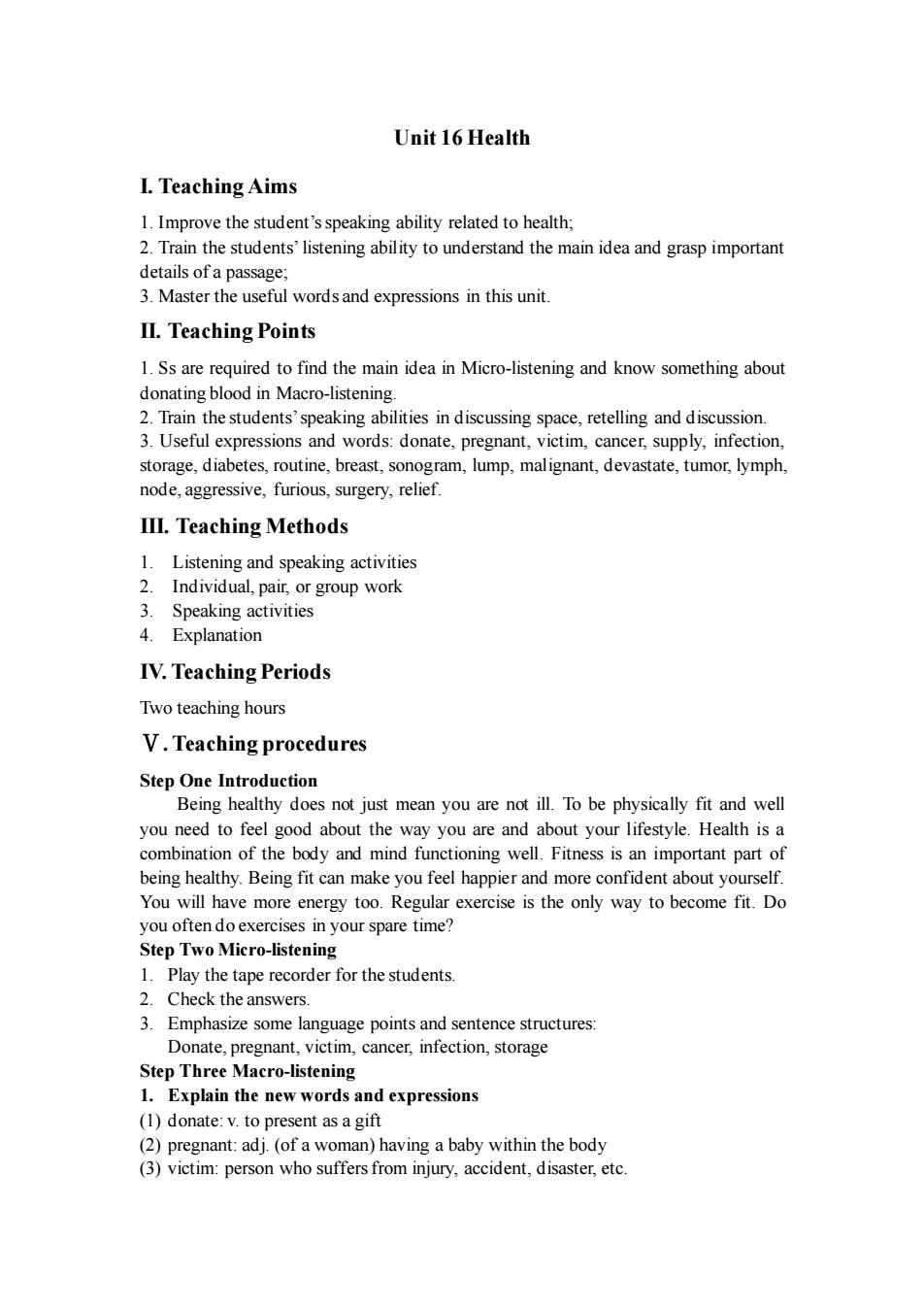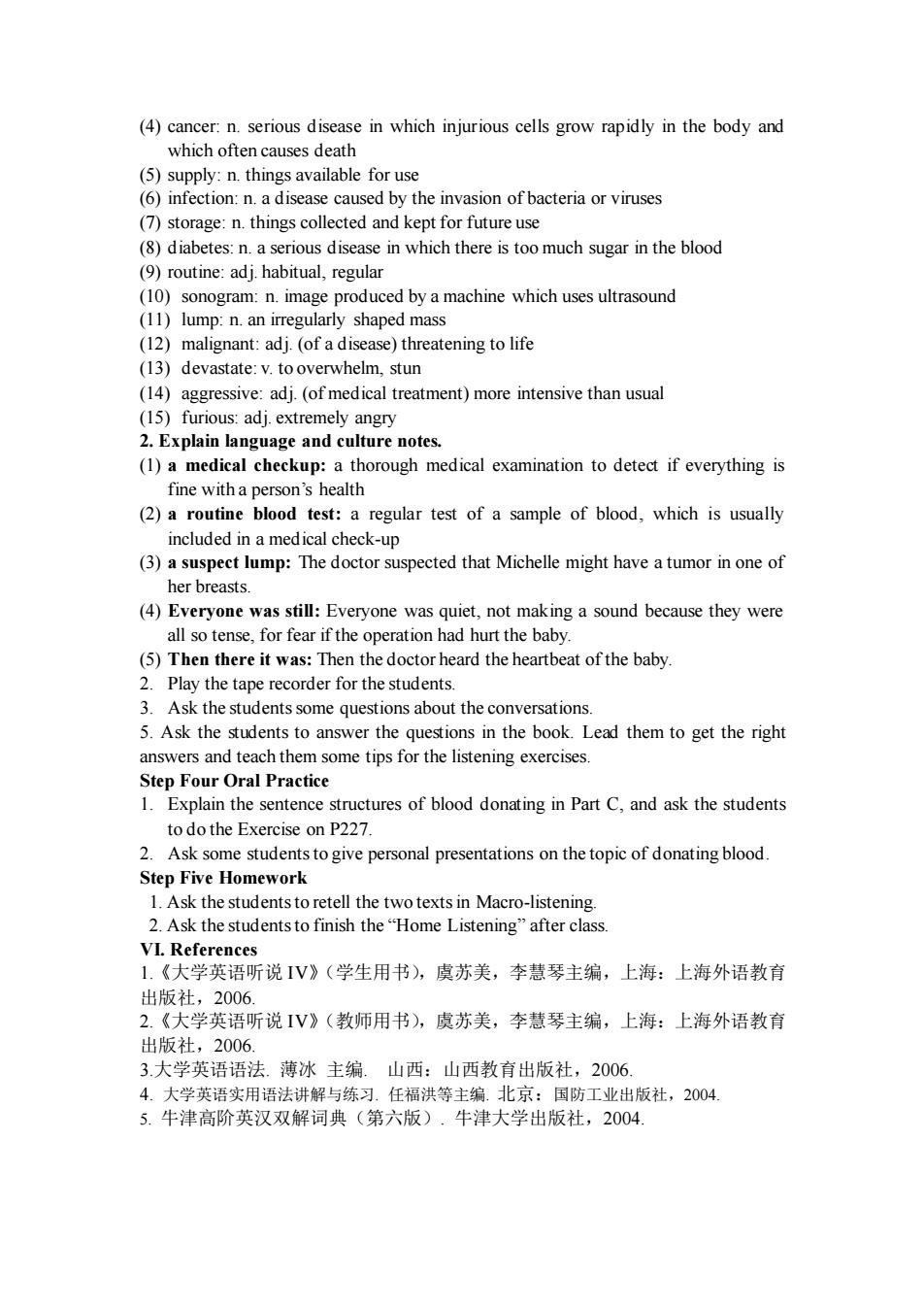
Unit 16 Health I.Teaching Aims 1 Improve the student's speaking ability related to health: 2.Train the students'listening ability to understand the main idea and grasp important details of a pa 3.Master the useful words and expressions in this unit II.Teaching Points 1.Ss are required to find the main idea in Micro-listening and know something about donating blood in Macro-listening. storage,diabetes,routine,breast,sonogram,lump,malignant,devastate,tumor,lymph, node,aggressive,furious,surgery,relief. III.Teaching Methods 1.Listening and speaking activities Individual,pair,or group work 3.Speaking activities 4.Explanation IV.Teaching Periods Two teaching hours V.Teaching procedures Step One Introduction Be ing healthy does not just mean you are not ill.To be physically fit and well you eed t fee god about the way you are and about your lifestyle.Health isa combination of the body and mind functioning well.Fitness is an important part of being healthy.Being fit can make you feel happier and more confident about yourself. You will have more energy too.Regular exercise is the only way to become fit Do Play the tape recorder for the students. 2.Check the answers. 3.Emphasize some language points and sentence structures Donate,pregnant,victim,cancer,infection,storage tep' 1 Three Macro-liste Explain the new words and expressions (1)donate:v.to present as a gift (2)pregnant:adj.(of a woman)having a baby within the body (3)victim:person who suffers from injury,accident,disaster,etc
Unit 16 Health I. Teaching Aims 1. Improve the student’s speaking ability related to health; 2. Train the students’ listening ability to understand the main idea and grasp important details of a passage; 3. Master the useful words and expressions in this unit. II. Teaching Points 1. Ss are required to find the main idea in Micro-listening and know something about donating blood in Macro-listening. 2. Train the students’ speaking abilities in discussing space, retelling and discussion. 3. Useful expressions and words: donate, pregnant, victim, cancer, supply, infection, storage, diabetes, routine, breast, sonogram, lump, malignant, devastate, tumor, lymph, node, aggressive, furious, surgery, relief. III. Teaching Methods 1. Listening and speaking activities 2. Individual, pair, or group work 3. Speaking activities 4. Explanation IV. Teaching Periods Two teaching hours Ⅴ. Teaching procedures Step One Introduction Being healthy does not just mean you are not ill. To be physically fit and well you need to feel good about the way you are and about your lifestyle. Health is a combination of the body and mind functioning well. Fitness is an important part of being healthy. Being fit can make you feel happier and more confident about yourself. You will have more energy too. Regular exercise is the only way to become fit. Do you often do exercises in your spare time? Step Two Micro-listening 1. Play the tape recorder for the students. 2. Check the answers. 3. Emphasize some language points and sentence structures: Donate, pregnant, victim, cancer, infection, storage Step Three Macro-listening 1. Explain the new words and expressions (1) donate: v. to present as a gift (2) pregnant: adj. (of a woman) having a baby within the body (3) victim: person who suffers from injury, accident, disaster, etc

(4)cancer:n.serious disease in which injurious cells grow rapidly in the body and which often causes death (5)supply:n.things available for use (6)infection:n.a disease caused by the invasion of bacteria or viruses (7)storage:n.things collected and kept for future use (8)diabetes:n.a serious disease in which there is too much sugar in the blood (9)routine:adj.habitual,regular (10)sonogram:n.image produced by a machine which uses ultrasound (11)lump:n.an irregularly shaped mass (12)malignant:adj.(of a disease)threatening to life (13)devastate:v.tooverwhelm.stun (14) aggressive:adj.(of medical treatment)more intensive than usual (15)furious:adj.extremely angry 2.Explain language and culture notes. (1)a medical checkup:a thorough medical examination to detect if everything is fine with a person's health (2)a routine blood test:a regular test of a sample of blood,which is usually included in a medical chec x-up (3)a suspect lump:The doctor suspected that Michelle might have a tumor in one of her breasts. (4)Everyone was still:Everyone was quiet,not making a sound because they were all sotense.for fear if the operation had hurt the baby. or heard the heartbeat of the baby Play the tape recorder for the students Ask the students some questions about the conversations. 5.Ask the students to answer the questions in the book.Lead them to get the right answers and teach them some tips for the listening exercises Step Four Oral Practice he sentence stru tures of blood donating in Part C.and ask the students to do the Exercise on P227. 2.Ask some students to give personal presentations on the topic of donating blood. Step Five Homework 1.Ask the students to retell the two texts in Macro-listening. 2.Ask the students to finish the"Home Listening"after clas VI.Re 折说)学生用书》苏美,李慧琴生编,上海:上海外语教有 . 出版社,2006. 2.《大学英语听说V》(教师用书),虞苏美,李慧琴主编,上海:上海外语教育 出版社,2006 3.大学英语语法.薄冰主编.山西:山西教育出版社,2006 4.大学英语实用语法讲解与练习 ,任福洪等主编.北京:国防工业出版社,200 5.牛津高阶英汉双解词典(第六版).牛津大学出版社,2004
(4) cancer: n. serious disease in which injurious cells grow rapidly in the body and which often causes death (5) supply: n. things available for use (6) infection: n. a disease caused by the invasion of bacteria or viruses (7) storage: n. things collected and kept for future use (8) diabetes: n. a serious disease in which there is too much sugar in the blood (9) routine: adj. habitual, regular (10) sonogram: n. image produced by a machine which uses ultrasound (11) lump: n. an irregularly shaped mass (12) malignant: adj. (of a disease) threatening to life (13) devastate: v. to overwhelm, stun (14) aggressive: adj. (of medical treatment) more intensive than usual (15) furious: adj. extremely angry 2. Explain language and culture notes. (1) a medical checkup: a thorough medical examination to detect if everything is fine with a person’s health (2) a routine blood test: a regular test of a sample of blood, which is usually included in a medical check-up (3) a suspect lump: The doctor suspected that Michelle might have a tumor in one of her breasts. (4) Everyone was still: Everyone was quiet, not making a sound because they were all so tense, for fear if the operation had hurt the baby. (5) Then there it was: Then the doctor heard the heartbeat of the baby. 2. Play the tape recorder for the students. 3. Ask the students some questions about the conversations. 5. Ask the students to answer the questions in the book. Lead them to get the right answers and teach them some tips for the listening exercises. Step Four Oral Practice 1. Explain the sentence structures of blood donating in Part C, and ask the students to do the Exercise on P227. 2. Ask some students to give personal presentations on the topic of donating blood. Step Five Homework 1. Ask the students to retell the two texts in Macro-listening. 2. Ask the students to finish the “Home Listening” after class. VI. References 1.《大学英语听说 IV》(学生用书),虞苏美,李慧琴主编,上海:上海外语教育 出版社,2006. 2.《大学英语听说 IV》(教师用书),虞苏美,李慧琴主编,上海:上海外语教育 出版社,2006. 3.大学英语语法. 薄冰 主编. 山西:山西教育出版社,2006. 4. 大学英语实用语法讲解与练习. 任福洪等主编. 北京:国防工业出版社,2004. 5. 牛津高阶英汉双解词典(第六版). 牛津大学出版社,2004